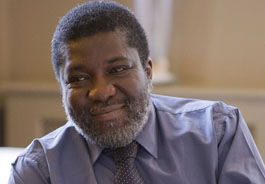Patient & Public Involvement & Engagement in Research – in conversation with Prof Ade Adebajo MBE
 Professor Adewale Adebajo, Consultant Rheumatologist and Clinical Director at Barnsley NHS Foundation Trust, and D4D Steering Committee Member was recognised in the New Year Honours with an MBE – for his services to promoting inclusive patient, and public involvement in health research. We talked to him about his hopes for patient and public involvement in 2021.
Professor Adewale Adebajo, Consultant Rheumatologist and Clinical Director at Barnsley NHS Foundation Trust, and D4D Steering Committee Member was recognised in the New Year Honours with an MBE – for his services to promoting inclusive patient, and public involvement in health research. We talked to him about his hopes for patient and public involvement in 2021.
“What are your thoughts on how public & patient involvement and engagement (PPIE) in research & innovation has developed and what could still be improved?”
It’s good to see that now we are at a point that PPIE is something that all researchers are aware of. When I first started in research, it felt like an alien concept for patients to be involved.
I was proud to be part of INVOLVE which was ground-breaking in its approach at the time. For example, I remember being in meetings with the NIHR where we were able to obtain a commitment to have a section specific to PPIE in all funding applications – we were able to make that happen.
We still need to be more sophisticated about how we do good PPIE. We need to continue to be thoughtful and creative about how we create and maintain welcoming and supportive environments and ensure people are able to stay involved in research by being appropriately resourced and supported. PPIE used to be seen as inviting a few patients to speak at a large steering committee meeting in a town hall – those days are gone.
“What are your thoughts on approaches to increasing participation from communities that have previously been under-represented?”
It’s important we continue to make those people already involved in research still feel welcome and valued despite our efforts to bring more people into the conversation. It’s not about getting rid of people it’s about broadening representation.
I don’t like the term “hard to reach” – if you look outside your office the people are there and want to be involved but you need to find them!
My advice to researchers would be to start with what you have (skills, energy and enthusiasm) and then identify what support and resources need to be brought in to increase involvement and bring the knowledge and expertise you don’t have.
Experienced participants already have the confidence to speak, debate, or challenge in meetings, focus groups or in public settings and we need to help other participants have that confidence so that their voices are heard.
One way is reaching out to communities where people feel more supported. People need to feel safe and comfortable to participate – and those community spaces could be a faith centre, or a community centre, for example in order to engage with parents where lack of childcare is a barrier to participation.
Researchers need to think more about time and resources rather than ‘that’s how we’ve always done it’.
“What drives you to continue to be involved in improving best practice in PPIE?”
As a researcher I feel it is my moral imperative to involve as many people as possible. I believe that research is for the many and not for the few – it shouldn’t be just for an elite group.
If we think about our different backgrounds and experiences, I think most people want to participate if they can in one way or another.
“What are your hopes for patient & public involvement and engagement in 2021?”
I hope we see new approaches to enable meaningful involvement which are more sophisticated. We also have a lot more to learn and understand nationally about reimbursement and how we recognise specific work with people and groups as more than an altruistic contribution.
Building on the work of the NIHR Dissemination Centre and NIHR INVOLVE, we have the new NIHR Centre for Engagement and Dissemination which will lead the NIHR’s work to make health and care research representative and relevant. This new chapter is the time for the research community to create “our own story and history” (to quote Jurgen Klopp!) and I look forward to seeing the Centre being part of that this year.
And finally, I look forward to continuing to work with Lise Sproson (D4D’s PPIE Lead) who has many wonderful ideas about widening participation – leadership in PPIE is safe in Lise’s hands!



